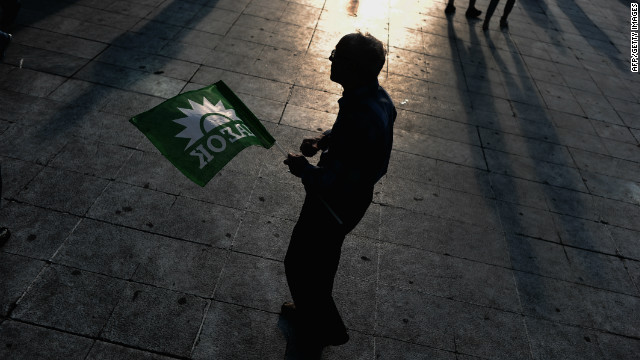Greek voters head to polls for key election amid austerity crisis
May 6, 2012 -- Updated 1246 GMT (2046 HKT)
Greek voters are expected to use the elections to 'punish' mainstream parties for the economic crisis.
STORY HIGHLIGHTS
- "Everything is at stake on Sunday," says Evangelos Venizelos, leader of PASOK
- No party is expected to win a majority in the vote
- Greece has been struggling under painful and unpopular austerity measures
- It has agreed to two bailout deals
Athens, Greece (CNN) -- Voters in Greece headed to the polls Sunday to take part in parliamentary elections amid wide uncertainty over what government will emerge and how it will handle the austerity crisis gripping the nation.
No party is expected to win a majority of the vote, meaning a coalition will again have to be formed.
The outgoing coalition government pushed through a series of painful austerity measures in order to secure emergency bailout funding for Greece, which is at the center of the eurozone debt crisis.
The two main parties that formed that coalition in November, PASOK and New Democracy, are expected to lose votes to a raft of smaller parties as people express their unhappiness at their country's economic plight.
Campaigning came to a close on Friday.
Evangelos Venizelos, leader of the left-leaning PASOK party, declared "everything is at stake Sunday," as he addressed a final campaign rally in the capital's central Syntagma Square, scene of many anti-austerity protests.



Voters have a choice, he said, to "remain in the eurozone and follow a difficult yet safe path" that will help the country get through the austerity measures -- or to follow "a dangerous path that can take us 20 years back, lead the country to bankruptcy and Greeks to massive poverty."
Antonis Samaras, leader of the right-leaning New Democracy party, urged voters to swing behind his party at a rally in Athens on Thursday.
He called for "a strong mandate to change everything ... I don't want to rule jointly with PASOK and it is not in the interest of the Greek people for such a joint governance to take place."
Opinion polls suggest New Democracy will take about a fifth of the vote, with Pasok a few points behind.
Far right parties are among the fringe groups expected to benefit from voters' disillusionment with the two biggest parties' backing for austerity measures.
The extreme right Golden Dawn, an ultra-nationalist party that blames immigrants for many of Greece's problems, may take more than 5% of the vote and claim seats in parliament, opinion polls suggest. Two years ago, it commanded only 0.28% support. Some members of the party have been linked with violent extremism.
Another far right party, LAOS, could take about 3% of the vote.
Parties on the other end of the political spectrum may also win greater support.
Surveys indicate SYRIZA, the Coalition of the Radical Left, could take just over 10% of the vote, with the Communist Party of Greece (KKE), which wants Greece to leave the single currency eurozone, close behind.
KKE leader Aleka Papariga told supporters Wednesday that the debate over whether or not Greece should stay in the eurozone was pointless. "Without a radical political change, a large section of the people will be fully bankrupted," she warned.
While the mainstream parties are still expected to win a greater share of the vote, the rise of fringe parties has had an impact on campaigning.



In a gesture to right wing concerns, for example, New Democracy has promised to be much tougher on illegal immigration if elected.
While his party backed the bailout deal, Samaras has said it doesn't allow enough scope for growth and wants to push through further privatization and cuts to public sector waste.
The austerity measures have already led to cuts in jobs, wages, pensions and benefits, and have badly affected many people, especially pensioners and those needing state help.
Taxes have gone up and unemployment is high, leading many young people to leave the country to seek work elsewhere.
The country's massive pile of debt has threatened the stability of the 17-country eurozone during a crisis that has dragged on for almost two years.
Greece pushed through a huge debt swap in March to save it from disorderly default and clear the way to receive its second bailout from the European Union, the European Central Bank and the International Monetary Fund, worth €130 billion ($171.5 billion).
The debt restructuring deal gave some breathing space to the euro zone bloc, where fears that Greece might collapse had increased pressure on other debt-laden nations such as Spain and Italy.
But the outcome of Sunday's vote will be closely watched to see if Greece is able to stick with the painful path of austerity.
CNN's Antonia Mortensen and Matthew Chance contributed to this report.





Δεν υπάρχουν σχόλια:
Δημοσίευση σχολίου
Σημείωση: Μόνο ένα μέλος αυτού του ιστολογίου μπορεί να αναρτήσει σχόλιο.